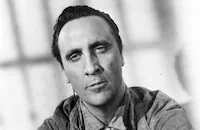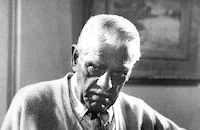Bikini Beach

Brief Synopsis
Cast & Crew
William Asher
Frankie Avalon
Annette Funicello
Martha Hyer
Harvey Lembeck
Don Rickles
Film Details
Technical Specs

Synopsis
Frankie, Dee Dee, and their surfing friends arrive at Bikini Beach for a vacation and meet The Potato Bug, a British recording star also vacationing there. Newspaper publisher Huntington Honeywagon, who is trying to obtain the beach for a senior citizens' retirement community, menaces the youngsters' beach fun, claiming that they have sunk to animal level. (Honeywagon uses his pet chimpanzee, Clyde, to demonstrate his point.) The youngsters have allies in Vivien Clements, a teacher, and Big Drag, operator of a teenagers' hangout. The Potato Bug is interested in drag racing, and when Frankie expresses a similar interest, Dee Dee, out of spite, flirts with the Britisher. Eric Von Zipper and his motorcycle gang join Honeywagon's campaign against the surfers. Meanwhile, under Vivien's influence, Honeywagon begins to change his opinion of the youngsters. When Frankie and The Potato Bug plan to compete in a drag race, Von Zipper sabotages what he thinks is the Britisher's car, hoping that Frankie will be blamed. The sabotaged car is Frankie's, and he barely escapes when the car crashes after the race ends in a dead heat. Von Zipper is found out, and he and his gang are defeated in a fight at Big Drag's place and are sent away. The Potato Bug leaves, Frankie and Dee Dee are reconciled, and Vivien and Honeywagon become friends.

Director

William Asher
Cast

Frankie Avalon

Annette Funicello

Martha Hyer

Harvey Lembeck

Don Rickles
John Ashley
Jody Mccrea
Candy Johnson
Danielle Aubry
Meredith Macrae
Dolores Wells
Paul Smith

James Westerfield

Donna Loren
Little Stevie Wonder
The Pyramids
The Exciters Band
Janos Prohaska

Timothy Carey
Val Warren

Keenan Wynn

Boris Karloff
Renie Riano
Crew
Samuel Z. Arkoff
Samuel Z. Arkoff
William Asher
Les Baxter
Karl Brainard
Butler-glouner Inc.
Butler-glouner Inc.
Anthony Carras
Anthony Carras
Jack Cash
Roger Christian
Marjorie Corso
Floyd Crosby
Von Deming
Robert Dillon
Fred Feitshans
Roger George
Red Gilson
Ross Hahn
Daniel Haller
Guy Hemric
Dean Jeffries
Milton Lustig
Tom Mahoney
Jack Merrill
Eve Newing
Eve Newman
James H. Nicholson
James H. Nicholson
Clark Paylow
Harry Reif
Kay Rose
Don Rush
Al Simms
Jerry Styner
Leo Townsend
Gary Usher
Joe Wonder
Joe Zomar

Photo Collections
Film Details
Technical Specs

Articles
Bikini Beach
Considering American International Pictures managed to churn out numerous beach films after this one, the answers to those questions should be obvious. However, plot has never been the strong suit of this series; instead, the joy lies in watching Disney idol Annette and chipper pop favorite Frankie strut their stuff with any colorful personalities available for a day or two of work under the AIP banner. Thus the viewer is treated to an oddball assortment of characters including kiddie actress Candy Johnson, underrated vocalist Donna Loren, some pop groups including the Exciters and the Pyramids, future Filipino horror icon John Ashley, future head-trip case Timothy Carey, a typically manic Don Rickles as the teen's sole "old generation" advocate, a rousing third-act appearance by "Little Stevie" Wonder, and even a cameo by Boris Karloff who would later have much more prominent roles in the series.
The talent behind the scenes is no less eclectic and is quite impressive, in its own fashion for drive-in fans. Director William Asher (a TV veteran best known for his pioneering work with Karl Freund on I Love Lucy) keeps everything bouncy and well-composed with the aid of cinematographer Floyd Crosby (who was simultaneously doing far more artful work on Roger Corman's Edgar Allan Poe/Vincent Price films), lounge legend Les Baxter strings everything along with a few choice music interludes, and one of AIP's greatest technical assets, production/art designer Daniel Haller (later a director in his own right), concocts a series of eye-catching locations straight out of a pop art dream. By this point after Beach Party (1963) and the somewhat lesser Muscle Beach Party (1964), the entire team had become a well-oiled machine capable of generating a couple of similar romps every year (or three in this particular case of 1964).
For Annette fans in particular, Bikini Beach represents a fascinating peek at the sexier side of the former Mickey Mouse Club star. Though Walt Disney had requested on her first beach film that she not expose her navel on-camera (which she happily complied with throughout the series), she turns up the heat a bit here with two different Frankies vying for her affections. Oddly, as she admits in her autobiography, A Dream Is a Wish Your Heart Makes, Annette regards the films with affection but never grew fond of the main setting itself. "I'd always hated the beach. The sea air made my hair frizzy, and as for surfing-forget it. In almost every picture, the director would call for a shot of me running down the beach, board tucked under my arm, then leaping gracefully into the surf and paddling out. But back then boards were over six feet long and weighed upward of twenty-five pounds. I tried several times, but the most they ever got out of it was a totally winded Annette gasping in the sand, my board lying several feet behind me."
Most Frankie-and-Annette fans cherish Bikini Beach for one standout song, "Because You're You" (later a solo standard for the latter), with other tunes including the title number, "Love's a Secret Weapon," "Gimme Your Love," and "How About That!" Meanwhile, fans of AIP's '60s output will thrill to the drag-racing scenes, among the strongest they ever filmed. Perhaps most interesting is the film's mocking attitude towards the Beatles (and, by extension, all of those upstart British rock-and-rollers); the Fab Four were commonly attacked with snide remarks (even by their own countryman James Bond in the previous year's Goldfinger), and the gentle (and amusingly inaccurate) ribbing seen here is a fascinating encapsulation of one country's entrenched status quo clashing head-on with the shape (and sound) of things to come.
Producer: Samuel Z. Arkoff, Anthony Carras, James H. Nicholson
Director: William Asher
Screenplay: William Asher, Robert Dillon, Leo Townsend
Cinematography: Floyd Crosby
Film Editing: Fred Feitshans, Eve Newman
Art Direction: Daniel Haller
Music: Les Baxter
Cast: Frankie Avalon (Frankie & Potato Bug), Annette Funicello (Dee Dee), Martha Hyer (Vivian Clements), Don Rickles (Big Drag), Harvey Lembeck (Eric Von Zipper), John Ashley (Johnny).
C-99m. Letterboxed.
by Nathaniel Thompson

Bikini Beach
Quotes
Imagine... boys and girls sleeping on the beach side-by-side, unchaperoned. Now what kind of society is it that would allow such a thing?- Harvey Huntington Honeywagon III
Sir, I consider you a member of the lower classes.- Harvey Huntington Honeywagon III
Baby, I think we associate with a very unstable group.- Frankie
Trivia
Miscellaneous Notes
Released in United States Summer July 1964
Released in USA on video.
Released in United States Summer July 1964















